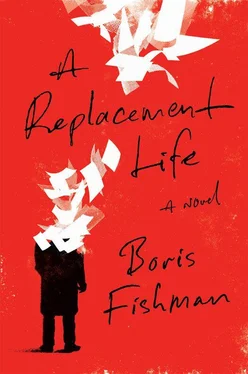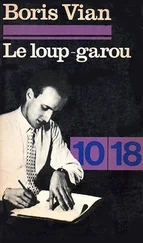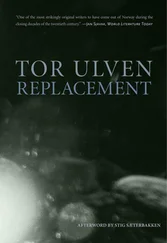Slava stepped out of the bathroom. On the edge of the beige leather sofa, an older man whom he didn’t know was lecturing a wild-eyed boy in a FUBU T-shirt. The boy didn’t seem to know Russian too well, but he listened, nodding politely. Next to them, one of the granddaughters was leading her grandmother through the letters on the boy’s T-shirt, an impromptu English lesson. “Foo-boo,” the grandmother telescoped her tongue. She really wanted to learn.
“And he says, ‘I am going to be a writer!’” Slava heard Grandfather say to the woman next to him on the love seat. She was nodding wearily; she knew the routine. “How do you like that? He was getting offers from— Hey, Slavchik!” Grandfather yelled. He waved Slava over. When Slava approached, Grandfather wrapped his free palm around Slava’s forearm like a glass of water.
“What is this new affectation?” Slava said, nodding at Grandfather’s other hand, wrapped around his collarbone.
“Nothing, nothing,” Grandfather said, dropping it to his side. He turned back to the woman. “This university, that university, some bank, a senator,” he continued to lie. “They all wanted him. Six figures. But Slavik said, ‘Not for me. Anyone can become one of those financiers. I want to be a writer. I want to help you, Grandfather.’ And so we said, ‘We will do everything’—Regina Alekseevna, I don’t have to explain, do I? — ‘whatever you need, we are going to help.’”
Regina Alekseevna nodded obediently.
Grandfather looked up at Slava. “Who wanted you to work for him, Slavik? Who was that senator?”
“Schumer,” Slava invented. “The senator from New York.”
“Not Kennedy?” Grandfather said disappointedly.
“Not Kennedy,” Slava said, spreading his arms in apology.
“Well, anyway,” Grandfather said. “This Shuma wanted them to write a book together, you see.”
As Grandfather talked on, Slava ran his free palm through Grandfather’s hair. It felt different than Slava expected, rough and dry instead of silky and ageless. That memory of it, Slava realized, was a decade old.
Slava knew why Grandfather kept a hand at his neck: a talisman. Against undefined rasps in the throat, against illness, against death. Slava wanted to pry it away, return it to the lap of Grandfather’s natty corduroys, to Grandfather’s forehead, so it could keep the mental abacus warm as Grandfather made his calculations: No, it’s not too late for him to become a businessman, not late at all…
One morning after Grandmother’s death, Berta had found Grandfather in bed surrounded by a moat of chairs, the backs facing him. “No, no, no,” Berta exclaimed, rushing the bed. “You can’t, you can’t.” He didn’t know how they’d gotten there.
Maybe Grandfather had begun covering his neck long before Grandmother died, only Slava hadn’t been around to notice. Maybe, while Slava was gone, Grandfather got old, his lying mind his only health. If you can invent, you must be alive still. Grandfather is . What would Grandfather tell Otto Barber?
Slava knew. Grandfather would shrug. He would express the deepest desire to help. Unfortunately, he had no information to offer but would as soon as he heard anything, naturally. Grandfather would let the letters go to Herr Schuler, may they all get covered up to their heads. And Grandmother would look on approvingly from the side. How else could it be? If she had wanted Grandfather to stop, she would have made him. Slava didn’t know many things about her, but he knew her power. And she didn’t stop Grandfather. Why would she have? To a friend she would not lie, but to the law she would not tell the truth. (What law? Where was the law when the Minsk ghetto was being “liquidated” along with her mother, father, and grandfather?) For a person like Grandmother, there was no law but what we find in each other. And Grandfather was the man she had found. Slava lived in a different country. A lie meant something different here, even if it was easier to pull off thanks to the American insistence on imagining the best about the next person. It wasn’t difficult at all to lie here, Slava had discovered with some regret, as it devalued his duplicities compared to Grandfather’s. Slava’s new country asked less of his ingenuity than the Soviet Union had asked of his grandfather. It would take nothing for Slava to deceive Otto Barber.
Slava patted Grandfather on his no longer silky hair and kissed his forehead, the kind gesture allowing Grandfather, in the calculus of affection demonstrated to Regina Alekseevna, to release Slava’s arm. What if Slava, naive Slava — his grandfather would run circles around him until his last day — had it backward about Grandfather’s friends? What if Grandfather wanted to have them in his life but couldn’t because he had lied about his age during the war to delay the draft? He told big stories about needing to mind the official records in Moscow or Minsk, but it was the Katznelsons, Kogans, and Rubinshteins that he had to continue to fool, to persuade that simply he had been too young for the draft in 1943, the year that was “cut down” in full: the year Dodik Katznelson lost a brother, Grisha Kogan three brothers, and Nina Rubinshtein enough cousins to fill a village, as they had before the war. The Katznelsons, Kogans, and Rubinshteins were Grandfather’s undisappearing accounting, long after he had disappeared from the Soviet Union. He hated them for it. This was why no one appeared in his home. He didn’t want anyone there, stumbling accidentally on the truth.
He couldn’t explain it this way to Slava, so he invented their insults, their distance. He kept inventing and inventing, unable to stop, until he had ended up alone, without friends, without his grandson. He had survived the war at the price of punishing himself for the rest of his life with the lie that had made it possible. Vera had saved Grandfather with the Rudinskys. Had tricked him when no one else could, granted him reconciliation without requiring a reckoning. Slava had saved him with the rest.
It was close to midnight by the time the guests started to leave. There were long kisses, embraces inside humid necklines, unmeant promises to call regularly now.
Slava watched Vera help her grandfather Lazar into his jacket. Lazar’s eyes were empty. He trembled as Vera walked him down the hallway, a branch quaking in the wind. When he pulled even with Slava in the line of farewell-wishers — Mother, Father, Berta subbing for Grandmother, Grandfather, Slava — Lazar lifted a trembling hand and clasped Slava’s, pulling it gently. He was phlox-colored, the skin stale and soft, the mouth in decay. Closer, closer, he gestured. Slava placed his ear next to Lazar’s spittle-covered mouth, thinking he wished to say something, but Lazar only turned his face until it was even with Slava’s cheek and kissed him there, his lips flat and dry. They left no trace except what Slava imagined.
“Here,” Lazar said. “Here.” He lifted his right hand, gnarled and shivering, and wedged a piece of material into Slava’s hand. In Slava’s hand was a rectangle of white cloth with an address, the kind Jews in the Minsk ghetto were required to wear underneath their yellow stars. It said: “54 Krymskaya.” And underneath: “Rudinsky.”
“My great-grandmother,” Vera said, leaning into be heard. “Grandfather’s mother.” Slava could smell her perfume, jasmine and honey. She spoke to him in Russian, so Lazar could understand. Her English was plain, colorless, sometimes even incorrect, but her Russian — at least to Slava’s ears, because she owned it far better than he — was as elegant as a palace. He felt overseen by it; for a passing moment, the two of them felt unnoticeable in the most crowded place in the apartment.
Читать дальше











